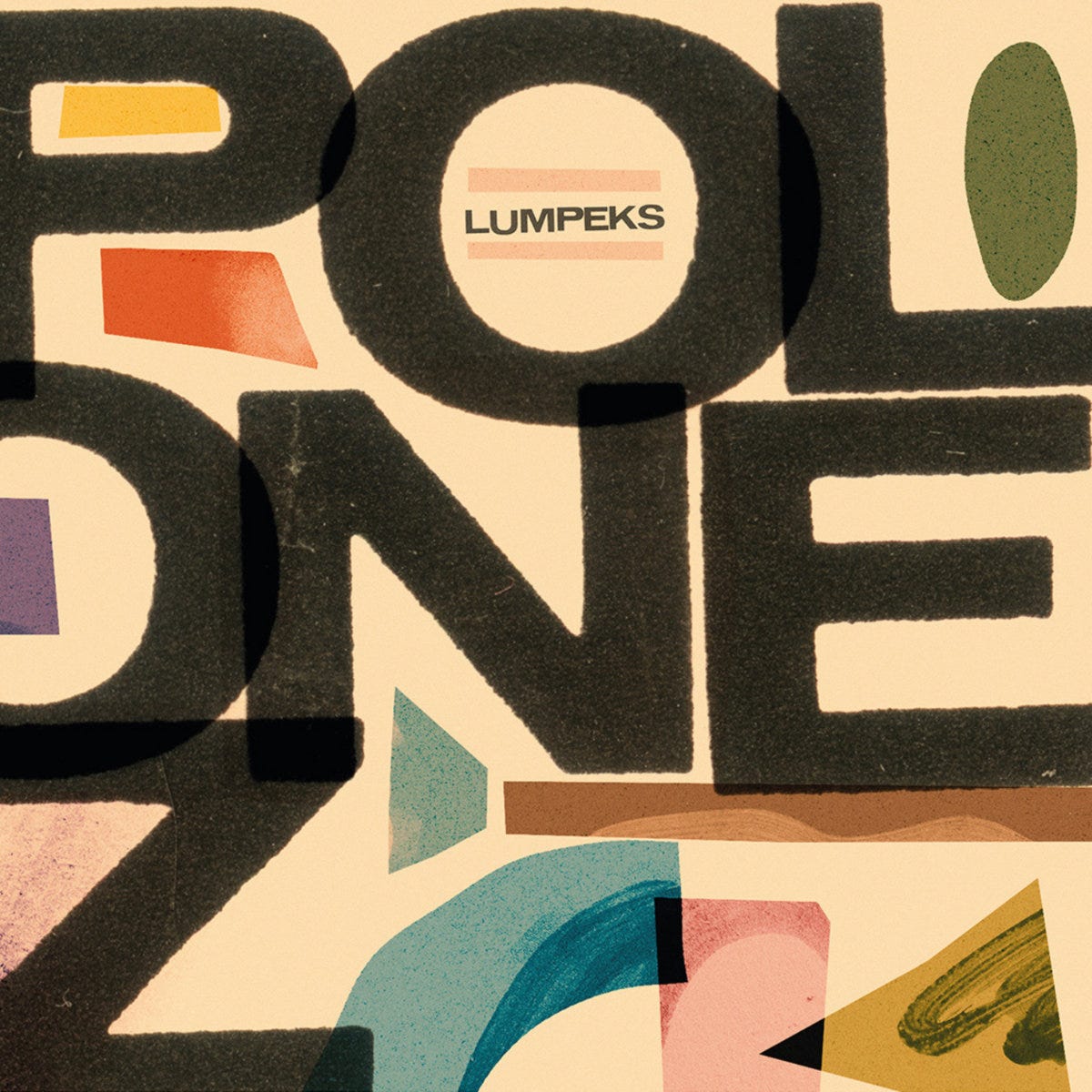Brzmi w Trzcinie #3: Lumpeks, aheloy!, LOUFR, Staś Czekalski, ania cringe
Covering three exceptional new albums and two teasers of highly-anticipated releases
Lumpeks, Polonez (Umlaut Records)
The first minute and a half of “Tete Deux Chevals,” Polonez’ opening track, sounds like a relatively faithful rendition of a Polish traditional dance song. If only made odd by the presence of saxophone, this short introduction is an instrumental oberek dotted with a cappella banter about love and work and play in rural Poland of yesteryear. Then, a fiddle takes center stage, and soon a harsh, incessant drone is formed around its repetitive strokes, foreshadowing what’s still to come: a highly original blend of folk and free jazz that’s ultimately more punk than any guitar album I’ve heard in recent years. For their third LP, the Polish-French quartet traveled through central Poland to source traditional songs from village singers, carefully take these songs apart, and ingeniously stitch them back together. Polonez’ ten tracks have been fashioned with angular brass interplay, polyrhythmic percussion, insistent bowing and unexpected bird calls, not to mention Olga Kozieł robust, sweeping voice: the element that most strongly grounds the music in tradition. On this outstanding album, Lumpeks neither pervert nor pay homage to its folk and jazz heritage, but truly bring both into the future.—Patryk Mrozek
aheloy!, Deep in the Big Blue Dream (Discos Extendes)
Having scored one of our albums of the year with genre- and mood-hopping Krajobrazy, Adrian Kolarczyk returned this year with his solo project aheloy!'s Deep in the Big Blue Dream for Portuguese label Discos Extendes. A more focused and refined record (I mean, just compare the covers), The Big Blue Dream retains some of Krajobrazy’s off-kilter charm and quirkiness. While that album seemed like a scattershot collection of different styles, Deep in the Big Blue Dream is a very focused fusion of dreamy ambient and club music made with enough precision and a light touch so that neither part overwhelms the other. The tracks mostly build from very minimal settings into slowly breathing mood pieces (“rO”) and more propulsive jungle-influenced tracks (“kaktus”), yet most often, like on the highlight “fortB,” land in a wonderful place in between, somehow both meditative and playful (like slightly desaturated Mouse on Mars or looser Jan Jelinek). Mostly though, Kolarczyk finds his very own shade of blue on this masterfully crafted and extremely listenable set of liquid tracks.—Łukasz Konatowicz
LOUFR, FEARS (Pointless Geometry)
Piotr Bednarczyk’s work as LOUFR has been said to revolve around the “aesthetics of noise, deconstructed club and hyperpop music,” but there is a certain sense of orderliness and direction to his new album that takes the music beyond the usual signifiers of these styles. Bednarczyk is a formally trained musician who’s collaborated with groups such as Ensemble Adapter, Twenty Fingers Duo, Ensemble Kompopolex, and Ensemble Synaesthesis (to name just a few), and his classical background shows. Sharp percussive bursts, grating supersaw riffs, autotuned vocals, breakneck speeds, and sudden compositional left-turns are all present on FEARS, whose sound design really stands in a league of its own. However, all these tropes have been put together with a sense of narrative purpose that is more archetypal of contemporary classical music than a typical 100 gecs track. For both deconstructed club and hyperpop—genres whose originality is often their chief limiting force—FEARS offers a possible way forward.—Patryk Mrozek
Staś Czekalski, “Koniec Lata” (Mondoj)
As I’m posting this, two other fragments of Staś Czekalski’s upcoming debut album are already floating around, but the especially buoyant instrumental “Koniec Lata” is still the most fitting introduction to both the album and the artist’s particular microcosm. Przygody, the title of the the LP, translates to “adventures,” and this first snippet showcases Czekalski’s spirit of exploration not just in its eclectic arrangement of timbres, but down to the notes that are being played: always rummaging around for the tonal center and never quite arriving, constantly suspended in a state of happy tension of “discovering without making the discovery.” “Koniec Lata” echoes the lo-fi lounge of Stereolab’s most meandering tracks: anchored around a looped, dubby bass riff, the song is supported and propelled by a chorus of percussion instruments that all sound teeny on their own, but together make the song burst with color. A wistful, finger-strummed figure of what sounds to me like a synthesized guitar provides the better part of the melody, which turns up almost like a person trying to make sense of their chaotic-but-playful circumstances, or maybe just becoming aware of their imminent end. Whichever it might be, for us listeners it’s really just the beginning of the adventure.—Patryk Mrozek
Staś Czekalski: Przygody is out March 1st on Mondoj Records.
ania cringe, “boska jola” (Striptiz Records)
Ania Włodarczyk has been twisting oversaturated indie-pop nostalgia into some pretty interesting new shapes as half of the duo Cudowne Lata. Her solo project ania cringe forgoes guitars and doubles down on the oversaturation for some kind of bizzaro universe eurodance. The newest single, “boska jola” goes even further: there's almost no lyrics, with wordless vocals chirping almost like a synthesizer over what's probably an actual synth and a driving programmed beat. It could be the closest anybody in Poland ever got to the PC Music territory: a wonderfully garrish dose of overstimulation.—Łukasz Konatowicz
ania cringe’s debut LP POLO DANCE will be out in March 2024.




